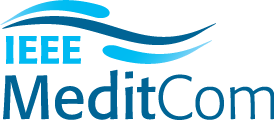
IEEE MeditCom 2021 Demo track provides a space for researchers and practitioners to bring hands-on experiences to conference attendees. We look forward to the interesting demonstrations of:
- Functional prototypes of devices and systems
- Mobile and wearable applications and services
- New interaction techniques
- Innovative examples of mobile experiences
- Toolkits and prototyping techniques for mobile and wearable interfaces
Demo submissions should be made via EDAS by following this link:
IMPORTANT DATES
Two-page demo descriptions/proposal: 15 April 2021
Notification of acceptance: 30 May 2021
Technical demonstrations showing/presenting innovative and original research are solicited. In general IEEE MeditCom 2021 Demo track is interested in demonstrations and Proof of Concept implementations of technology that validate important research issues or showcase realistic applications in the following topics of interest (but not limited to):
- 5G Mobile Systems and their Components
- Network Architectures, SDN, NFV
- Cloud Communications and Data-center Networks
- Optical Networks and Systems, Radio over Fiber
- Mobile and Wireless Communications and Networking and Beyond
- Molecular and Nanoscale Communications
- Satellite and Space Communications
- Underground and Underwater Communications
- Image, Speech and Signal Processing for Communications
- Big Data and Machine Learning for Communications
- Semantic Web and Ontologies
- Internet of Things, Smart grids, and Vehicular Networks
- Green Communications and Energy Efficient Computing
- Network Applications and Services
- Analytical Models, Simulation, Testbeds & Prototypes
- Network Management and Cognitive Radio
- QoE/QoS Support and Cross-layer Optimization
- Performance Evaluation of Communication Systems
- Massive MIMO, Signal Processing, and Coding
- Advanced PHY and MAC techniques
- Security, Privacy, Trust and Blockchain
- Cybersecurity
DEMO paper submission instructions
Submissions should be a two-page proposal summary that follows the IEEE formatting guidelines: refer to the IEEE submission instructions for details. Be as specific as possible in describing what you will demonstrate or display as demo.
A complete submission should be two pages in length and will include the following:
- A 35-word abstract
- An Overview section giving a full description of the research and technologies to be demonstrated
- An Innovation section describing the problem and novelty of the approach in solving it
- A section describing the relevance for MeditCom explaining why the MeditCom audience and communities should be interested in this demo
- The demo proposal summary should explain the objective and contents of the demo, and detail its configuration and main elements. The objective should be to demonstrate an innovative application, a working prototype or a novel concept
- Demonstrations should be based on technical achievements and prototypes at a research stage (i.e. no pre-commercial or product demonstrations are allowed).
The demo session will take place online or locally, depending on the conference type (hybrid or virtual). Summaries of accepted demos will be included in the IEEE MeditCom 2021 Proceedings. Accepted and presented summaries will be submitted to IEEE Xplore®.
DEMO CO-CHAIRS
Lena Wosinska, Chalmers University of Technology, Sweden
Harilaos Koumaras, NCSR Demokritos, Greece
